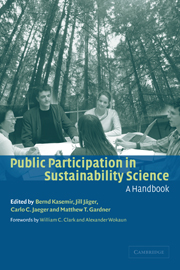Book contents
- Frontmatter
- Contents
- Notes on contributors
- Foreword: science, participation, and sustainability
- Foreword: sustainability, energy use, and public participation
- Preface
- Acknowledgments
- Part I Concepts and insights
- Part II Experiences with IA Focus Groups
- Part III Further forms of participation
- Part IV Future perspectives
- References
- Index
Preface
Published online by Cambridge University Press: 22 September 2009
- Frontmatter
- Contents
- Notes on contributors
- Foreword: science, participation, and sustainability
- Foreword: sustainability, energy use, and public participation
- Preface
- Acknowledgments
- Part I Concepts and insights
- Part II Experiences with IA Focus Groups
- Part III Further forms of participation
- Part IV Future perspectives
- References
- Index
Summary
This book is the result of collaborations by a network of researchers across Europe and beyond. As a group, we share the conviction that sustainability science needs public participation to be successful. We also think that in order to really work, such public participation requires not only an open mind on all sides, but also improved tools. How did we reach this conviction?
Sustainability is an elusive concept. One of the few things that can be said with certainty is that sustainable (as well as unsustainable) development depends on an intricate web of interactions in linked systems, both natural and social. This web cannot be steered by any simple action into a premeditated direction. There is no easy way to open this Gordian knot, and trying to do so with the proverbial sword would damage rather than enhance our chances of a sustainable future.
This situation implies two things. First, sustainability cannot be approached by a grand master plan with a precise mapping of the end point and the trajectory to get there. Rather, it is ‘our common journey’ as humankind; it consists of one tentative step after the other, with the need for continuous feedback about whether we are going roughly in the right direction or not (National Research Council 1999). Given the complex systems involved, there is not much hope of achieving such meaningful feedback without using the potential of modern information technology, especially computer modeling.
- Type
- Chapter
- Information
- Public Participation in Sustainability ScienceA Handbook, pp. xxiii - xxvPublisher: Cambridge University PressPrint publication year: 2003

